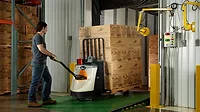Carts and hand trucks increase maneuverability
New concept delivery vehicle maximizes payload


Increased SKU counts, tight warehouse and retail spaces, and delivery personnel who manage heavy cases and kegs are driving the proliferation of new mobile carts and hand trucks designed to improve ergonomics and enable warehouse staff to safely stack, retrieve and deliver products.
At retail, the ability to quickly load and unload is critical for beverage deliveries, enabling more stops on a route, more efficient route management and decreased labor costs, says Mike Ludka, marketing manager with ORBIS Corp., Oconomowoc, Wis.
“With mobile pallets, the platform used to ship products is also used as a merchandising platform,” Ludka says. “They roll from the truck to the retail aisle with no repacking. When positioned at retail, mobile pallets convert to static mode and offer a shopper-friendly merchandising unit. To improve cross-selling in a retail environment, they can convert back to a mobile pallet and be rolled to another aisle in the store to support sales lift during promotions.”
Carts and platforms that are manufactured in smaller footprints can fit into narrow spaces, freeing up storage space while helping the growing number of small-format retailers with distribution center challenges, including the need to frequently order SKUs, limited back-room space and the lack of receiving docks, Ludka adds.
ORBIS Corp. offers the Pally, a part pallet, part dolly delivery solution, which combines the mobility of a dolly with the functionality of a static pallet to enhance traditional material handling methods. “This dual feature allows product loads to be rolled from a delivery truck directly to the aisle with only one touch point and no down stacking,” Ludka says. “It eliminates extra platforms and labor for faster unloading.”
Designed for direct-store-delivery (DSD), Greenville, N.C.-based Yale Materials Handling Corp. announced a suite of features for its MPB045VG Walkie pallet truck that was unveiled at ProMat 2017 in Chicago. Highlights include a patented mid-mounted retail delivery handle, a moveable backrest, a load-retention strap system and is powered by lithium-ion batteries, which provides a more reliable, flexible power solution, says Shelley Bell, industry manager for food and beverage at Yale.
“Lithium-ion batteries have a lifespan of five times longer than lead-acid batteries,” Bell explains. “In beverage delivery applications, personnel must be able to maneuver in tight spaces and require dependable power to get the job done.
“No matter the company or cargo, DSD operations all pursue the same goal — make deliveries as efficiently as possible with the utmost load integrity,” she continues. “Our retail delivery package offers a combination of enhanced maneuverability, reliable power, ergonomics and safety to keep products moving in tight spaces without requiring operators to run back to base for a new battery.”
The compact truck also can operate at creep speed for optimized maneuverability, visibility and control in congested store aisles or trailers, she adds.
Industry-changing concept
As DSD operations look to keep delivery professionals’ health and safety in mind, innovations also have expanded beyond carts and hand trucks.
To keep pace with increased SKU counts, smaller delivery quantities and the need for innovation in the DSD model, York, Pa.-based Precision Distribution Consulting Inc. (PDC) unveiled a new, patented delivery system at the National Beer Wholesalers Association’s convention, which took place last September in Chicago. PDC partnered with Goshen, Ind.-based Supreme Corp. on the production of a new concept vehicle.
The Manuverate system is a concept vehicle that maximizes vehicle payload while simultaneously solving ergonomic and efficiency limitations of traditional side-bay and rear-end-load delivery vehicles, says Greg Ellis, president of PDC.
“There are a myriad of factors impacting delivery and confronting drivers in the current dynamic,” Ellis explains. “The Manuverate delivery system holistically addresses ergonomics, capacity, accessibility, environmental and productivity concerns without compromising one benefit for another. Based on our experience and knowledge of the circumstances and challenges affecting the people who deliver products or packages, this system design addresses their needs.”
The Manuverate incorporates a multi-axis delivery mechanism — both horizontal and vertical movement — that brings products or packages to the person, thereby, eliminating digging, climbing or sorting of products or goods, Ellis says. The system also maximizes truck capacity while improving safety and productivity of delivery personnel, simplifies the material storage and handling process, and utilizes case handling in a modular format, he adds.
“This system is a game-changer for the beverage industry, which has been challenged to more effectively and efficiently load, transport and deliver products,” Ellis says. “The average keg weighs between 160-170 pounds. The Manuverate dispenses cases and kegs in the most forward position at the optimal waist level to reduce the risk of injury.”
To facilitate the movement of heavy loads like vending machines and vis-coolers into tight spaces, San Jose, Calif.-based Ultra Lift Corp. offers the Ultra Lift Model 1500 Powered Hand Truck. It uses a combination of motorized lifting, leverage and balance to reduce operator effort and improve control in vending moves, says company President George Dabb.
“Operator safety is a primary concern for bottlers,” Dabb says. “[The] Ultra Lift operation is controlled by a single power switch, and the device operates seamlessly over obstacles such as curbs and thresholds, up and down stairs, under low doorways, and on and off trucks.”
The Ultra Lift also increases bottler profits by improving operator safety and reducing injuries; improving productivity because one person with an Ultra Lift can safely handle loads that require two or more on manual moves; and reducing damage because loads are broken back, set down and moved under power with maximum leverage and control, Dabb says.
“One strong trend in vending operations is toward the increased use of powered hand trucks versus manual hand trucks for all vending moves,” Dabb says. “Sprains and strains can average over $40,000 per incident, and this device can virtually eliminate them. Even when loaded with an 800-pound vender, the Ultra Lift Model 1500 will routinely do 500 or more stairs on a single battery charge.”
Product stability
Experts note that maintaining the stability of a product, user safety and performing regular maintenance can ensure that hand trucks are operating at peak efficiency, eliminating downtime, delayed shipments and deliveries, and lost revenue.
“No matter the product, stability is critical,” Yale Materials’ Bell says. “… To help reduce downtime, many operations are turning to telemetry systems to monitor their hand/pallet trucks’ maintenance. It all starts with the truck though. Operations need to make sure they purchase hand/pallet trucks designed with durability and reliability in mind — backed by a reputable lift truck [original equipment manufacturer] (OEM) who will stand behind their products.”
ORBIS’ Ludka highlights that as eCommerce continues to grow, omni-channel solutions will become even more essential to the supply chain.
“Pick-to-cart is a common method used as retailers seek to grow their eCommerce fulfillment, optimize small-format store deliveries and fulfill online pick-up orders,” Ludka says. “… The retail industry is going through a large transition. The number of ways consumers can get their goods is causing a need for a faster and higher-performing supply chain process.
“Tote and cart systems and mobile pallets that can support frequent deliveries [and] improve picking accuracy and efficient distribution practices can drive customer satisfaction and loyalty by making the right product available at the right time and place,” he continues. “Demand is likely to increase, so systems that can withstand change, enable ergonomics and have a long service life are likely to evolve with the industry.” BI
Looking for a reprint of this article?
From high-res PDFs to custom plaques, order your copy today!








